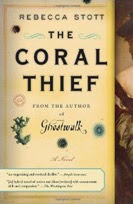When he arrived in Paris, on a hot July night of 1815, Daniel Connor was full of expectations. He was to work with Professor Cuvier at the Jardin des Plantes, with an offering of rare coral specimens, a mammoth bone, an introduction letter, and the preface for the English translation of Cuvier’s book by Jameson, his professor in Edinburgh. But he fell asleep on the mail coach alongside a mysterious beautiful woman who stole it all, while leaving his money untouched.
Napoleon is on his way to his second exile, the island of Saint Helena. In Paris, where Lamarck’s ideas of transformism are all the rage among the students, Daniel arises the interest of Henri Jagot, the chief of police of the Bureau de la Sûreté, an ex-thief who modelled his surveillance methods on Napoleon’s secret police, compiling file after file for every criminal in the country. While the painting stolen from all over Europe are hung out from the Louvre walls, Daniel meets again Lucienne Bernard, his thief, who promises to give him back his belongings. But Jagot is after her too, and everything gets slightly more complicated than what the young man can understand.
The streets of Paris were hot and dusty; foreigners in holiday spirits made their way to the gallery to see the latest gaps in the walls. Everyone was talking. Wellington’s name was wispered everywhere. Defeating Napoleon at Waterloo had made him a kind of god. Now he had become the puppet master who controlled the strings in Paris. They said it was Wellington who had given the autorisation for the Prussian army to enter the Louvre. Wellington was playing it slow, as diplomatically as he could, but he was lighting matches over a powder keg, the English papers said, sending soldiers into the Louvre like that.
The Parisians were incensed. These trophies Napoleon had brought back to Paris where for them, for France. They were theirs: their paintings, their Venetian horses, their sculptures. They belonged to Paris. And of course, everyone still half-believed that at any moment Napoleon would stroll back into Paris as if nothing had happened and send all the ambassadors and diplomats and soldiers packing.
 Rebecca Stott introduces us in a world where the history of science cannot be taken apart from the turmoils of History. As the falling empire risen after the Revolution is replaced by a new monarchy and foreign armies are occupying Paris, Cuvier’s ideas of cataloguing the whole animal kingdom represent the preservation of the society status quo with its settled hierarchies, while the transformist ideas of Lamarck are the symbol of ordinary people taking the reigns of power, such as Napoleon, a Corsican who walked up his way from second lieutenant to emperor.
Rebecca Stott introduces us in a world where the history of science cannot be taken apart from the turmoils of History. As the falling empire risen after the Revolution is replaced by a new monarchy and foreign armies are occupying Paris, Cuvier’s ideas of cataloguing the whole animal kingdom represent the preservation of the society status quo with its settled hierarchies, while the transformist ideas of Lamarck are the symbol of ordinary people taking the reigns of power, such as Napoleon, a Corsican who walked up his way from second lieutenant to emperor.
The Coral Thief (edition Spiegel & Grau, 2010, 320 pages), is written by Rebecca Stott (Cambridge, 1964), novelist and professor at the University of East Anglia in Norwich. She is also an affiliated scholar at the Department of the History and Philosophy of Science at the University of Cambridge.
Photo credit: Miroir de Cendres

No comments:
Post a Comment